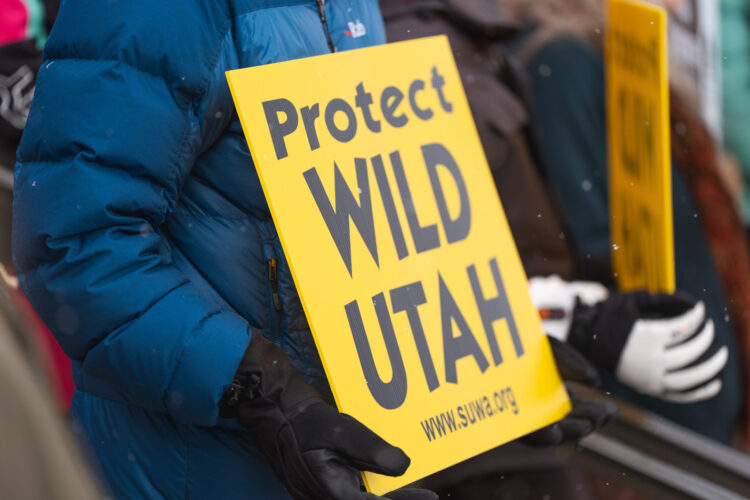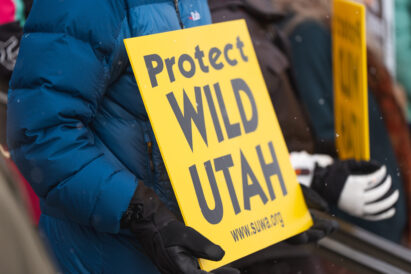Judge dismisses case aimed at stopping Utah from reviving its public land lawsuit

Spenser Heaps for Utah News Dispatch
People rally in opposition of Utah’s lawsuit attempting to take control of federal lands at the Capitol in Salt Lake City on Saturday, Jan. 11, 2025.A judge has dismissed a lawsuit from environmentalists that argued Utah’s now-failed petition to the U.S. Supreme Court to gain control of millions of acres of federal land was unconstitutional, which would have prevented the state from bringing a similar case forward in the future.
On Wednesday, 3rd District Court Judge Thaddeus May dismissed the lawsuit from the Southern Utah Wilderness Alliance, siding with the state in a case that stems from Utah’s 2024 petition to wrest control of 18.5 million acres of Bureau of Land Management, or BLM, land.
But since the U.S. Supreme Court declined to hear Utah’s case, May said the environmental group’s argument is now moot.
“The non-existence of that suit is fatal,” May wrote, while also finding the group’s “statements about any future action to be too vague to be redressable.”
The Southern Utah Wilderness Alliance, or SUWA, disagreed with the ruling — since Utah leaders, including Gov. Spencer Cox, have suggested they will try to re-file the lawsuit in a lower court, they still have a case, the group said.
Utah filed its lawsuit with the country’s high court in August of last year, arguing that it’s unconstitutional for the BLM to hold “unappropriated land” — land that lacks a formal designation — in perpetuity. Unappropriated land does not include national parks, monuments, or forests. It’s often used for cattle grazing or wildlife habitat, with much of it found in Utah’s west desert.
SUWA filed a lawsuit in December arguing the petition violated the Utah Constitution. Utah, the constitution reads, must “forever disclaim all right and title to the unappropriated public lands.”
But not long after SUWA filed its lawsuit, the U.S. Supreme Court declined to hear Utah’s case, which the state was attempting to bring directly before the high court. State leaders, including Utah Gov. Spencer Cox, said they might try filing a similar lawsuit in a lower court.
SUWA then filed an amended complaint, based on Cox and other leaders’ comments, in an effort to prevent the state from trying to revive its lawsuit.
In a hearing last week, May heard arguments for and against keeping the lawsuit going. During the hearing, May seemed to suggest it would be easier for SUWA to sue Utah once they actually re-filed their complaint.
“If the suit is unknown, why is it not better to wait for that suit to be filed in federal court and then have a reaction? Why does this court have to preempt that decision or that lawsuit?” May asked.
In a statement, SUWA’s legal director Steve Bloch said he disagreed with the ruling, and was considering “potential next steps.”
“We’re disappointed with today’s decision but grateful that the true intent of the state’s lawsuit has been made clear: to force the sale of millions of acres of public lands to the highest bidder and not to acquire these lands for the state, as its deliberately misleading media campaign suggests,” Bloch said. “It’s our position that with the repeated statements made by Governor Cox — doubling down on the state’s intent to refile its lawsuit in federal district court — Judge May had what he needed to proceed with our case and conclude that Utah’s constitution prohibits the state from bringing a lawsuit like this in the first place.”



